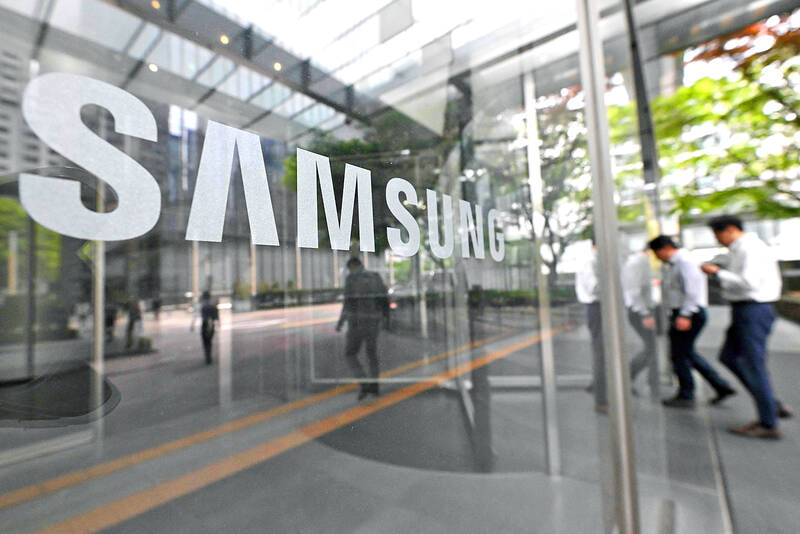Samsung Electronics Co unveiled a number of forthcoming advancements to its technology aimed at attracting makers of artificial intelligence (AI) chips.
Although, Samsung is the world’s No. 1 memorychip maker, it has been trying to catch up with rival Taiwan Semiconductor Manufacturing Co (TSMC, 台積電) in the foundry market, where companies manufacture customer-designed chips.
Samsung’s share in the foundry market slid to 11 percent in the first quarter of this year from 11.3 percent in the previous quarter, while TSMC’s share climbed to 61.7 percent from 61.2 percent during the same period, according to Taipei-based research house TrendForce Corp (集邦科技).

Photo: AFP
Samsung on Wednesday announced several new types of production technology and laid out its chipmaking road map and outlined its vision for the AI era at its annual foundry forum in San Jose, California.
The advanced process introduced by Samsung uses so-called backside power delivery network technology, which places power rails on the backside of a silicon wafer. Such technology enhances power, performance and area, while significantly reducing the drop in voltage, compared with its first-generation 2-nanometer process, the company said.
The South Korean chipmaker also said that its ability to offer logic, memory and advanced packaging would help it make rapid progress in winning outsourced semiconductor manufacturing orders for AI-related chips.
The company predicted that its AI-related customer list would expand five-fold and revenue would increase by nine times over current levels by 2028.
Samsung executives declined to comment on the status of the company’s attempts to supply the latest advanced memory chips to Nvidia Corp, which produces AI accelerators that are a must-have for all large technology companies.
They also did not respond to reports that it has not yet been able to achieve qualification of such chips at the US company.
The company touted its gate-all-around (GAA) technology, which is key for AI products.
Samsung said it plans to mass produce its second-generation 3-nanometer process in the second half of this year and deliver GAA on its upcoming 2-nanometer process.
In 2022, the company became the first in the industry to begin GAA-based 3-nanometer mass production.
The chipmaker affirmed that its preparations for 1.4-nanometer are progressing smoothly, with performance and yield targets on track for mass production in 2027.

NEW IDENTITY: Known for its software, India has expanded into hardware, with its semiconductor industry growing from US$38bn in 2023 to US$45bn to US$50bn India on Saturday inaugurated its first semiconductor assembly and test facility, a milestone in the government’s push to reduce dependence on foreign chipmakers and stake a claim in a sector dominated by China. Indian Prime Minister Narendra Modi opened US firm Micron Technology Inc’s semiconductor assembly, test and packaging unit in his home state of Gujarat, hailing the “dawn of a new era” for India’s technology ambitions. “When young Indians look back in the future, they will see this decade as the turning point in our tech future,” Modi told the event, which was broadcast on his YouTube channel. The plant would convert

‘SEISMIC SHIFT’: The researcher forecast there would be about 1.1 billion mobile shipments this year, down from 1.26 billion the prior year and erasing years of gains The global smartphone market is expected to contract 12.9 percent this year due to the unprecedented memorychip shortage, marking “a crisis like no other,” researcher International Data Corp (IDC) said. The new forecast, a dramatic revision down from earlier estimates, gives the latest accounting of the ongoing memory crunch that is affecting every corner of the electronics industry. The demand for advanced memory to power artificial intelligence (AI) tasks has drained global supply until well into next year and jeopardizes the business model of many smartphone makers. IDC forecast about 1.1 billion mobile shipments this year, down from 1.26 billion the prior

People stand in a Pokemon store in Tokyo on Thursday. One of the world highest-grossing franchises is celebrated its 30th anniversary yesterday.

Zimbabwe’s ban on raw lithium exports is forcing Chinese miners to rethink their strategy, speeding up plans to process the metal locally instead of shipping it to China’s vast rechargeable battery industry. The country is Africa’s largest lithium producer and has one of the world’s largest reserves, according to the US Geological Survey (USGS). Zimbabwe already banned the export of lithium ore in 2022 and last year announced it would halt exports of lithium concentrates from January next year. However, on Wednesday it imposed the ban with immediate effect, leaving unclear what the lithium mining sector would do in the